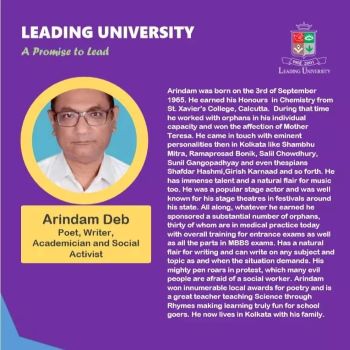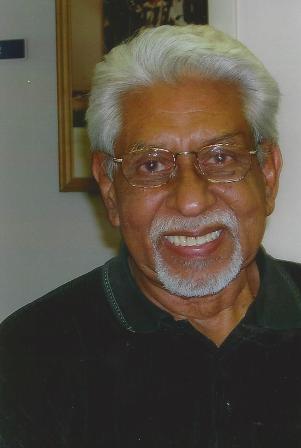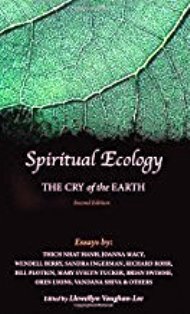The Grapevine Art & Soul Salon: World Voices
Welcome to the new version of our WORLD VOICES column. Our friend Ravi Kumar, host of this salon chamber, is in India now and we look forward to his continued contributions to The Grapevine. We have expanded our readership and are collecting far more contributions from writers around the world, many of which will be posted here.
Arindam Deb is a teacher and author/poet in Calcutta, India, who is also affiliated with Every Child Lifeline Charity Foundation where The Grapevine has found many friends and contributors. Enjoy this humorous piece:
ARINDAM DEB: THE STORY OF MY BIRTH
It was in 1965, the 3rd day of September. I was born in Kolkata (then Calcutta), in the southern flanks of the city, at Ramakrishna Mission's Seva Pratishthan Hospital (better known as Shishumangal Hospital for its legendary gynecology wards).
Unfortunately, my complexion was darker even than the darkest granite stone available in the world then.
Out of sheer disappointment, my mother, who was of milky white complexion, bellowed out, "This cannot be MY baby! The hospital authorities have surely zapped my baby and put in someone else's instead! She barked at my father, "You sue the HOSPITAL SUPER!"
My father, though extremely firm and a strong man, strict to the core in work and discipline, could do little to change the chaos to peace. He was an executive engineer then in DVC, a government undertaken company formed mainly to generate thermal and hydel power along the valleys around the River Damodar, a tributary of the River Ganges. It is chief supplier of electricity in the states of West Bengal and Jharkhand (once a part of Bihar) in India. Father miraculously could, she thought, through HIS own usual bellow, blurt out to his junior engineer colleagues to get something done. This was the Home Frontier, and the Home Minister was my mother!
Seeing his helpless plight, a sympathetic or rather empathetic gynecologist, Dr. Pijush Roy, tried to pacify Ma.
"Mrs. Deb, your baby it is indeed! And doubtlessly so. Please see! Take him in your arms, feel his weight! He is four and a half pounds. I can never be mistaken there! And he is also doing fine!"
My Mom yelled out again. "Don't I know it, Dr. Roy? An overweight baby, constantly kicking around and then coming out upside down, contrary to the way babies usually come into the world?"
Seeing that my Ma was not cuddling me in her arms, I answered her bellow with one of my own, showing my competence to compete with the best bellowers in the country. Adding my voice made an alarming and uncanny rise in the decibel level.
That was the time of the 1965 Indo - Pak War, on an evening of a blackout designed to baffle Pak aircraft and keep them from bombing Calcutta. Our combined bellows made the Indian Army shiver in terror. The sound, they thought, would expose them to sound frequency centre identification, giving the Pakistan Army a chance to bomb Calcutta city!
Frantic to do something, my paternal aunt suggested to my father that he bathe me in donkey's milk, which, once upon a time, Queen Elizabeth had done to achieve a fairer complexion.
Dr. Roy consulted Seva Pratishthan, then Hospital Super as well as the President Maharaj of RKM (Ramakrishna Mission, an organisation founded by Swami Vivekananda, who was disciple-in-chief of Ramakrishna and supposedly an incarnation of God, for the welfare and nursing of the sick and downtrodden, just the way Missionaries of Charity, founded by Mother Teresa, is). He wanted to know whether and how that suggestion could be materialized. This was an SOS condition, as our combined bellowing frequency was leading to the level of a hospital building collapse!
The Super agreed, but at the same time alarmingly said that the donkey's milk was in a semi-frozen state and needed to be thawed before the bath, else I would surely catch a pneumonia chill. However, by flash pasteurization, the milk was readied, and I was successfully bathed in donkey's (also known as ass's) milk. Lo and behold! My complexion changed like magic from jet black to brown.
Thinking the troubles were over, my Pa now proudly placed me beside Ma. That seemed to compound the problem. The donkey milk bath had created a stench around my body, worse even than the combined leakage of ammonia and sulphurated hydrogen gas could ever produce!
Except for Ma, the whole floor, including the entire gynecology ward, had to be vacated. Some baby goats, kept in the basement as a source of mutton stew for weak convalescing patients, tore away the chains with which they were tied and fled from the hospital premises! Ultimately, some attar or perfume had to be imported from Afghanistan and applied to my body, finally restoring a normal scent.
My mother wanted to name me Ghatotkacha the Demon, but at my father's plea named me Arindam, also a Rakshasha, a demon, son of Ravana and better known as Indrajeet or Meghnaad, one who is victorious over his own enemies.
Ari = enemy
Daman = suppress
Combo of Ari daman = Arindam
Have a nice evening!
©Arindam Deb

WorldVoices: Ravi Kumar, Host
For Issue 24, we are bringing back an article Ravi Kumar wrote for Issue 20 because the content is so relevant to our general themes and concerns today.
Renewing our Reverence for Nature

For this issue of The Grapevine, I will look into a book that goes beyond human voices of the world to include what the author calls the "cry of the earth" for human attention: Spiritual Ecology: The Cry of the Earth, 2nd ed., a book of essays edited by Llewellyn Vaughan-Lee (Point Reyes, CA: The Golden Sufi Center, 2016). The book is filled with conversation about environmental concerns along with spiritual and social considerations. I've chosen to review the essay written not only by someone who is also from India but someone who shares my name.
Satish Kumar, editor of Resurgence Magazine, introduces us to a trinity of terms that in Sanskrit are yagna, tapas and dana, from an ancient and revered Hindu text, the Bhagavad Gita. He defines them as follows: Yagna relates to human/nature relationships, tapas relates to human/divine relationships, and dana relates to human/human relationships. He says, "I have translated this trinity into English as Soil, Soul and Society." (135)
I will return to these terms. Let me first mention my own observations.
Like many people, I have had the pleasure of digging the ground, turning it to make it suitable for growing vegetables. It has given me immense pleasure to watch my crops of cucumbers, okra, tomatoes, eggplants and bell peppers grow and to bring them to the kitchen from which they would make their way to the table and into the mouths of my family. It satisfied me deeply to participate in this soil-related process. Soil not only gives us food. It provides many other things without which humanity could not survive.
As humans, our relationship to nature is deteriorating every day. We deplete nature in the name of technological, industrial, and trade progress. We're using harmful chemicals and pesticides to increase food production. Yet, there are more and more starving people in the world. So many people go hungry, without food or water fit for drinking. Satish Kumar gives us this statistic: In spite of the unprecedented growth in the economy, science, technology and world trade, almost half of humanity is hungry, homeless, and ignored. (144)
Many Gods are named in Hindu texts, the chief among them a trinity, and each has a consort in nature. To generalize and include a monotheistic view, nature can be seen as the consort of God. In Hinduism, the consort of Krishna was Radha, of Shiva was Parvati, of Vishnu was Laxmi. Radha, Parvati, and Laxmi are forms of nature, and the Gods joined with nature to produce us. That is why we Hindus worship nature in the form of Radha, Parvati and Laxmi.
In our time, the number of people going to houses of worship is going down, and when they do go, it is often for the purpose of socializing rather than worshipping. Mandirs are full of people who come to express what they want materially. I do not know about mosques or synagogues or churches, but I have heard it is the same. People are focused on earning money. Their own self-interest and opinions matter most. Power over others seems to be the goal: more and more, we "worship" in our own interests, and so we don't take care of nature, we exploit nature. Our going against nature hurts the Gods. They nevertheless have enormous energy and reserves, and are patient with humanity beyond imagination.
As Satish Kumar says, Humanity is not only at war against nature, it is at war against itself: the values of profit, power, control and greed rule the minds of mainstream politicians and industrialists, advertising and misinformation seduce the minds of the majority of people who dream of a lifestyle based in consumerism, comfort and extravagance. (145)
These are signs of a loss of soul.
Likewise, society is full of tension. The new religion of materialism has grown side by side with the growth of militarism. (145) There is now a threat of nuclear war, and terrorist groups like ISIS seem to be growing. Corruption and self-interest create insecurity, and conflicts are on the rise. People tell lies and get elected to high offices.
According to S. Kumar, one of our greatest problems is this:
We have developed a worldview which dictates that the human species is superior to all other species. Animals, forests, rivers and oceans must serve and fulfil not only the needs of humankind but also the greed and desires. This way of thinking has been called species-ism which means that one species, the human species, is the superior species above all others. (136)
He mentions 8.7 million species on earth (143) and calls for recognizing the value of all: when we recognize the intrinsic value of all life, small or large, then it is deep ecology. A blade of grass, an earthworm, an insect, even a mosquito has the right to live; so have trees, rivers, birds and fish irrespective of their usefulness to humans. (137-8)
In my view we have moved away from preserving nature (our environment). The divine cannot be seen, so fewer and fewer people believe in the divine, as if whatever we see, only that exists and nothing else. Our social relationships are going from healthy to poor as families drift apart and social ties come undone.
S. Kumar does not simply lay out the problems we face, he also suggests paths to solving them. According to the principle of yagna we should celebrate the beauty, the abundance and the grandeur of nature by replenishing what we have taken. If we take five trees to build our home we must replenish them by planting fifty trees. (139) He discusses how we can follow the yagna principle of replenishment, restoration and renewal by replacing plants with manure and compost and by leaving the land fallow for a time after seven years of cultivation.
Regarding the Gita teaching that we need to care for soil (yagna) and soul (tapas), Kumar gives the example of Gandhi who urged us to Be the change you want to see in the world. He continues,
Mahatma Gandhi integrated into his day time for prayer, mediation, solitude, study, gardening, cooking and spinning and considered these activities as essential as negotiating with the British rulers of India, organizing the campaign for independence and working for the removal of untouchability. (143)
Finally, Satish Kumar calls anew for a strong social movement to establish justice, equality, liberty and freedom, leading to the well-being of all. (145)
That is dana. Such a movement would bring the trinity of soil, soul, and society into harmony and health again.
We can see evidence of that health and harmony in a video from India:
India Plants 66 Million Trees in 12 Hours as Part of Record-breaking Environmental Campaign
Copyright 2021, Barbara Knott. All Rights Reserved